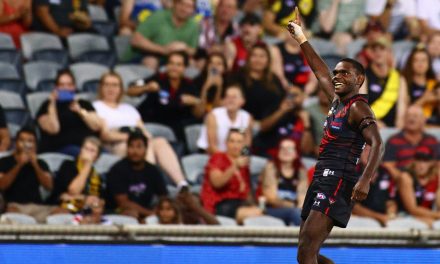Richmond pair Callum Coleman-Jones (left) and Sydney Stack were fined and suspended. Photos: GETTY IMAGES
Culture is a word which in the context of AFL football, is very much open to interpretation. Nuance is something for which coverage of the game has little time.
So culture regularly becomes a sort of catch-all explanation for problems a club might face which can’t be directly and conveniently attributed to the scoreboard.
And a lack of nuance dismisses the possibility of on-field success in spite of off-field issues, or for that matter, that the best culture in the sporting universe might still be a backdrop to on-field disaster.
That just confuses those observers who’d like two plus two to equal four every time, forgetting that in football it sometimes can actually equal 13, or some other indivisible number.
That’s how Richmond must seem to them right now, a type of jigsaw into which the usual pieces don’t appear to fit.
As the catalogue of off-field incidents involving the Tigers lengthens, the fines for various indiscretions accruing and players embarrassing the club, a storyline appears to be writing itself. It’s a favourite of the sporting world, too, involving a rise and a fall.
In this case, of an AFL club which after decades of failure created an environment which sought inclusion and the embrace of vulnerability, found an on-field synergy which propelled it from also-ran to dual premier, but then sunk under the weight of its own hubris.
Sounds compelling, but is it accurate? I’m sceptical, though you can already back it in that if Richmond even loses to Geelong on Friday night, let alone fails to make it three flags in four years at the end of October, it’s going to be repeated ad nauseum.
It’s getting a solid enough workout now as it is, even alongside the obvious contradiction that the Tigers have in fact continued winning – six of their past seven outings and nine of 11 having ended in victory.
“This is a club that has had success, that have been so strong culturally – now I just think the success has almost gone to their head,” ventured commentator Kane Cornes, admittedly not generally known for his nuanced take on matters football.
“There’s definitely a sense of entitlement, a sense of arrogance about that club at the moment … the best clubs, the ones that I admire the most, are those dynasties that went about their work so humbly like Geelong, like Hawthorn of this era. That’s not what can be associated with Richmond at the moment.”
It’s an interesting analogy, even aside from the fact both the Cats and Hawks (wrongly in my view) frequently wore accusations of hubris from opponents and media alike during their spells at the top. Such charges become almost inevitable for a club at the top the longer it stays there.
And in the case of Geelong, for example, it was actually an off-field indiscretion (involving Steve Johnson and his subsequent club-imposed suspension) which is often cited as an important catalyst in both he and the Cats as a group getting their collective you-know-what together.
The potential for the “kebab kerfuffle” involving Sydney Stack and suspended teammate Callum Coleman-Jones to indeed prove a rallying point wasn’t lost on another commentator in Nick Riewoldt.
“It might impact them positively, because if they are hurting, they say: ‘hey, this isn’t us, let’s get back to who we are and what makes us great’,” Riewoldt said on Fox Footy.
Indeed, if you’ve read Konrad Marshall’s account of Richmond’s 2017 season “Yellow And Black”, you know that support, inclusion and a balance of professional responsibilities with everyday life became a cornerstone of the Tigers’ success both on and off the field.
You could as easily mount an argument that not only are Richmond’s slip-ups in 2020 simply a case of an over-indulgence of the latter, a balance easily enough restored, but that it is a club in better position than any rival to deal with them swiftly and effectively.
But maybe even that potential positive, or the significance of Johnson’s penance back in early 2007 are also overstated.
Because whether a culture is strong or poor at an AFL club, it’s hard to see how even a string of off-field incidents in a relatively short space of time indicates it’s fundamentally changed.
The Tigers have spent a number of years building a strong environment around their core business. That incorporates too many elements to rattle off in a convenient link to the on-field, things like welfare and educational programs, mentoring, the deeper dive into the arena of psychology via mindfulness coaching.
It’s proved its worth now in on the field results for nearly four years on an incredibly consistent basis.
Call me a sceptic, or at least someone who prefers a bit of nuance, but I’m not sure an ill-judged trip to a beauty parlour by a player’s wife, some childish dressing room antics, or even a drunken visit to a strip club and a damaged kebab are compelling enough evidence that it’s all come unstuck.
This article first appeared at ESPN.












Great article Rohan thank you for article with no bias just common sense.